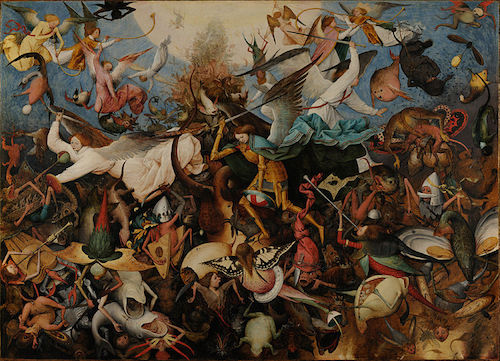We run our website the way we wished the whole internet worked: we provide high quality original content with no ads. We are funded solely by your direct support. Please consider supporting this project.

Theology That Accounts for Terrorism
The general assumption of both the Old and the New Testaments is that the earth is virtually engulfed by cosmic forces of destruction, and that evil and suffering are ultimately due to this diabolical siege. Jesus defined himself and his ministry in terms of aggressively warring against Satanic forces. Both he and his disciples recognized that he had come to destroy the devil and his works.
In this light, it is quite peculiar that after Augustine, throughout the church’s history up to the present, very few thinkers conceived of Satan as being in any way relevant to, let alone central to, the solution of the problem of evil. In terms of arriving at an ultimate explanation for evil, after Augustine the question always gets filed under the category of God’s providence instead of under the category of spiritual warfare, that is under the topic of what Satan and rebel angel and fallen humans freely choose to do against God’s will.
With Augustine it becomes a problem of understanding evil as a part of God’s will.
By contrast, the NT and the early postapostolic church always thought of the world as being caught up in a cosmic battle and thus as saturated with horrifying suffering and diabolical evil. That is the final explanation for evil. While the NT and the early church fathers taught that God is the final “why” as to the existence of all things, after Augustine, it is assumed that God is the final “why” for how these things and beings existed.
But the NT locates the ultimate “why” of evil actions in the angelic or human beings who bring about those actions.
In a state of war, bullets fly, bombs explode, mines are stepped on, and children are maimed. War is hell. This is expected. The only real problem is in confronting the evil and in overcoming it.
At the same time, the warfare worldview is admittedly not a worldview that many modern people find easy to accept. To many contemporaries, the notion is preposterous that real, semi-autonomous, self-determining and invisible spirits exist that can and do influence our lives. The whole thing sounds more like something out of a Star Wars movie than like serious contemporary theology.
One of the primary reasons that this is the case is due to the adoption of a model of divine perfection, which was derived form Hellenistic philosophy by Augustine and other thinkers in the church.
For example, from Plato, Aristotle, and the subsequent Hellenistic tradition, the church arrived at the notion that God was altogether unmoved, impassible, immutable, nontemporal and purely actual. Yet it is precisely these features of the church’s doctrine of God that undermines the warfare worldview. On the basis of this model of God, a meticulous, sovereign, divine blueprint was postulated to encompass all temporal events, including the idea of a cosmic war with evil.
This, however, renders the war a sham. For a war that meticulously follows a blueprint that has been drawn up by one of the parties involved in the war (God) is hardly a real war.
—Adapted from God at War, pages 55-67
Image: The Fall of the Rebel Angels, by Pieter Bruegel the Elder
Related Reading

A Non-Violent Creation
A biblical teaching that we often overlook regarding the centrality of non-violence concerns God’s original vision of creation. We have grown so accustomed to the violence we experience as a part of nature that we don’t even question whether it is supposed to be the way it is. However when we see God’s vision for…

Podcast: Why Was Satan Allowed Into the Garden to Begin With?
Greg considers why Satan was allowed into the Garden. http://traffic.libsyn.com/askgregboyd/Episode_0372.mp3

The Violent “Church Triumphant”
In light of how central enemy-loving non-violence is to Jesus’ teaching and to his cross-centered revelation of God, we have to wonder why the church has refused to listen to its head and instead condoned violence, as pointed out in the previous post? Christian theologians have used OT’s violent portraits of God, at least since…

Podcast: If the Crucifixion Is God’s Victory Over Satan, Why Does Satan Keep Fighting?
Greg talks already-but-not-yet, perspectives of the principalities, and the toilsome life of a muon. http://traffic.libsyn.com/askgregboyd/Episode_0284.mp3

On Attending to the Light in Darkness
Joe Spurr via Compfight Donald Miller has posted a reflection on his Storyline blog about highlighting goodness and thereby pointing to Jesus in the aftermath of events such as the bombing in Boston this week. We want to emphatically declare together that “an enemy has done this” (Matt 13:28). But we also want to be a people…

A Visit to Auschwitz
Ever since I first learned of the full horror of the Holocaust when I was a freshman at the University of Minnesota I have had a kind of obsessive fascination with it. I’ve studied every aspect of Hitler and the Third Reich and about the philosophy that led to their “Final Solution.” In fact, for…
